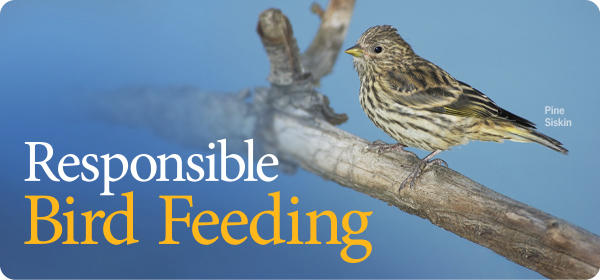Wild Birds Unlimited Recommends Responsible Bird Feeding
If you enjoy feeding and watching your backyard birds, then you probably want to do as much as you can to practice your hobby safely and ensure the birds’ overall health and well-being. While the incidence of birds falling ill from feeders is small compared to other natural hazards birds face, there are things you can do to help your birds stay healthy. Responsible bird feeding techniques play a crucial role in helping to prevent the spread of disease among bird populations. The following strategies will help you to improve the health and safety of your birds.
Healthy Bird Feeding Techniques
• Bird feeders with cracks and crevices are difficult to clean and sanitize. We recommend replacing them with new feeders.
• Only use feeders that can be easily cleaned.
• Limit the amount of seed provided in feeders to only the amount your birds will consume in one or two days.
• Give the birds more space. The addition of more feeders, spread far apart from one another, will reduce the crowding of birds that is often found around a single feeder. This will reduce the birds’ stress and the potential for disease transmission between healthy and sick birds.
• Periodically move feeders to new locations in the yard to avoid the build-up of waste materials and droppings.
• Clean feeders and all hardware every few weeks, more often during times of heavy use or during warm and damp conditions, with a 10% bleach (one part bleach to nine parts water) solution. Clean bird baths in the same manner but more often. Rinse thoroughly and allow to completely dry before refilling feeders and bird baths.
• To clean feeders:
o Take apart feeder and remove any visible debris.
o Wash all parts with soap and water using a clean bottle brush.
o Soak all parts for 10 minutes in a diluted bleach solution or one hour in a weak vinegar solution. Skip this step if cleaning a hummingbird feeder.
o Rinse thoroughly.
o Allow to dry completely before putting feeder parts back together.
• Whenever handling feeders, wear gloves if possible, and wash hands with soap and water.
• Be sure to keep the ground below and around the feeders clean. Rake up and discard seed debris and bird droppings on regular basis.
• Only use high quality bird seed with no milo, wheat, or other grains (fillers).
• Store all birdseed in rodent- and insect-proof containers to avoid contamination.
• Discard any seed that has become wet, moldy or foul smelling.
• Avoid handling sick birds. If you must touch a sick bird, wear gloves if possible, and wash hands with soap and water.
For other tips or questions, stop by our store and talk to one of our Certified Bird Feeding Specialists.
*Sources Include: Cornell University – Cornell Lab of Ornithology 159 Sapsucker Woods Ithaca, NY 14850 – Project Feederwatch feederwatch.org, https://feederwatch.org/learn/feeding-birds/#safe-feeding-environment


